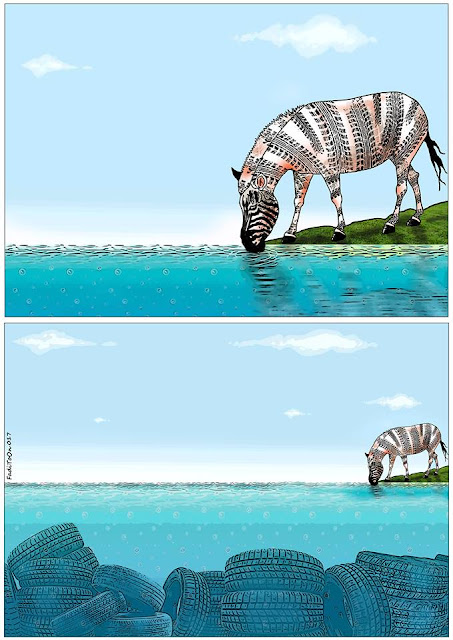"The white paper was impossible"
The title to this blog post was inescapable in its double association to the white and as yet unadorned paper and the necessity to express oneself. The artist finds it impossible to keep silent, while the prisoner tries to avoid marking the paper in the sham elections of Assad since his taking power in 2000. In unison Sulafa Hijazi and Tarek Alghorani manifest the corruption of humankind in an autocracy.
In the artworks by Sulafa Hijazi bodyparts have been ripped apart. There is no bleeding, no outward reaction. The drama is in the suppression of everything human, while the severed bodyparts are serving the intent of the despot. To the extent that the body grows weaponry. And yet the severed heads have each their expression; every part of the picture planes has texture. There is no surrender into a solid calm. Not even in the red background. Especially not that one in its dense coagulation.
The militarized disease that is and was the Assad regime is addressed by Tarek Alghorani in words as clear-cut as Sulafa draws. Tarek endured imprisonment and torture for 5 1/2 years, convicted for blogging. He was one of a larger group of political prisoners granted amnesty in the spring of 2011 in an attempt from the regime to calm the call for change. His words are poignant on the right to remain silent that comes with the right to speak up:
 |
| Sulfa Hijazi, Sacrifice, November 5, 2011. |
BY TAREK ALGHORANI
Freedom also means rejection.
Denial of rights and freedom of expression also means rejection of expression and the right to remain silent.
The prisoner cannot reject presidential amnesty.
The rejection of presidential amnesty
It was a kind of luxury and perhaps foolish to think of in Syria
I was not able to legally reject the amnesty, as a kind of protest
A protest... about everything
 |
| Sulafa Hijazi, Untitled, 2012. |
In states of dictatorship
The right is also a duty
You must elect your president not as a right, but a duty
And you are an observer to the exhibition of chase because you did not exercise your "right"
In Assad's country silence was banned
Silence means rejection
The citizen must participate in any action by the system
It celebrates the military coup
and sings and dances
and proclaims the joy
 |
| Sulafa Hijazi, Untitled, 2012. |
The citizen has to attend the sham elections
To elect B: Yes or No
On the survival of the president in power
The white paper was impossible
And in front of the ballot box the militaries are holding you at gun point watching what you write
 |
| Sulafa Hijazi, Untitled, 2013. |
The amnesty was granted and I am in prison
I was angry
I had not sinned in the first place
Now too I should have forgiveness from the president
To my mind the president should have asked me to pardon him
Out of the detainee is a new birth
Born into the world again
 |
| Sulafa Hujazi, Untitled, 2013. |
I was ready to make the sacrifice and stay another full two years in prison refusing to be pardoned
If you were in a less dictatorial country then maybe
But even to try to reject amnesty would have lead to death
The law makes no difference
I cannot reject amnesty
 |
| Sulafa Hijazi, Untitled, 2012. |
I did not put anything on a white paper
I did not go to the elections ever
I am talking about the Syrians
their experience
Maybe I was an anomaly
- anomaly in that Tarek would never fall into his opponent's category, assuming to be speaking on behalf of everyone.
The artworks shown are courtesy of Sulafa Hijazi and must not be reproduced without her permission. A special thank you to her and to Tarek Alghorani for his permission to bring words that were spoken personally and to Tony Daoud for engaging in the discussion.

